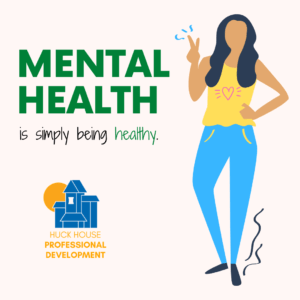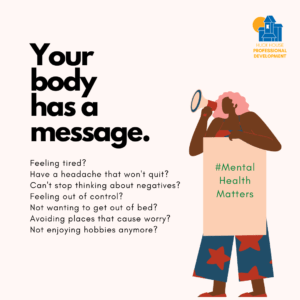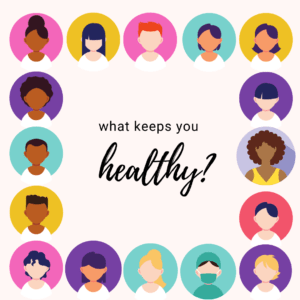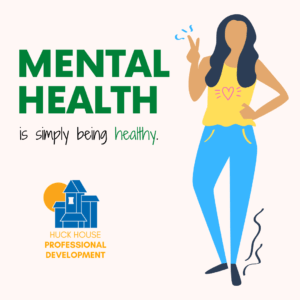Mental Health Awareness
From the desk of Professional Development
Since the stay-at-home order started, the conversation around mental health has changed significantly. More celebrities and journalists are openly writing about how their experience has impacted how they feel. Therefore, more people are talking positively about how to care for ourselves. But what happens when everything goes back to how it was?
Because, things will get back to how they were…
We will return to working in our offices.
We will return to running errands without face masks.
We will return to attending school in a classroom instead of a bedroom.
Adjustment is hard
Transitioning to the stay-at-home restrictions and likewise back to ‘how things were’ are major life adjustments. Adjustment is always hard. Even when we are adjusting back to what we know. It’s important to remember with any adjustment, can also come unhealthy mental health symptoms, like,
- feeling sad, struggling to get out of bed
- being worried
- ‘just not feeling it’
- trouble sleeping
If you struggle with adjustment, that’s okay. It doesn’t mean you’ve failed or something is wrong. You’re not alone and you’re doing great!
Mental Health Will Still Exist
While our lives slowly return to what’s comfortable, it doesn’t mean our mental health automatically changes or disappears. Just as your physical health will always be a factor in caring for yourself – so is mental health.
What is mental health?
I struggle with using the term ‘mental health’ because it automatically makes people think ‘sick’. Mental health is simply being healthy. And everyone has mental health.
Also, like physical health, there are different ways to care for your mental health. There are different diagnoses, struggles, and forms of treatment. For some, it’s having someone to talk to or someone to help the negative voices in your head not sound so loud. Fortunately, there are many different forms of therapy, support, and medication that can help manage unhealthy mental health symptoms or help you keep your mental health healthy.
Break the barrier of stigma
Using ‘mental health’ interchangeably with ‘sick’ is how we create stigma. Stigma that makes people feel excluded and shamed for seeking help. So, before we move on, let’s make an agreement – mental health means being healthy and caring for yourself. Everyone has mental health. Everyone needs to care for themselves.
Grief is Mental Health
Together with, the difficulties of adjustment, we each are going through a grieving process. Many are getting through it by the hope that everything will return to “normal” soon. However, we don’t know what the future holds. Medical experts are warning even after states re-open, we may not be able to stop wearing masks in public, still need to limit our travel, or protect ourselves in other ways. That leaves us to grieve once again.
We are grieving what we once knew, once enjoyed, or felt comfortable with. Sadly, this is apart of surviving a pandemic. While many aspects of our lives will return to how they functioned previously, many things may not return. Or may return farther out than what feels comfortable.

Physical Health and Mental are Linked
How our bodies feel influence how our mind feels. Likewise, our mind influences how our body feels.
A sign that your mental health needs fine tuning, might be your body…
- feeling sick with no physical health cause
- having stomach aches that don’t get better with medicine
- feeling exhausted after a good night’s rest
- a headache that won’t go away
- trouble sleeping
- feeling like you can’t turn your brain off
Check in with your body
When these come up, check in with your body. Ask yourself “what is my body trying to tell me”. By doing this simple step, you are bringing awareness to your health. Once you are aware, you can create a plan to address the need that is not being met. That might sound like “headaches have always been a problem, but I’m getting them more often now, I should go see a doctor” or “I feel like my partner isn’t listening to me”.

Awareness of how to stay healthy
Caring for yourself can look different for different needs. If someone struggles with…
- feeling out of control
- feeling like their thoughts are fighting them
- they hear voices that scare them
- nightmares
- not being able to focus or sit still
- see things that aren’t there
…their needs are going to look different for someone with a different life experience.
How to figure out what your needs are.
Caring for yourself is having awareness of your needs and working to meet those needs. Ask yourself – what keeps you healthy? Physically & Mentally. Your answer to this question are your needs.

Plan to Meet Your Needs
Above all, during times of transition, adjustment, and change, remember to set aside time to plan. Plan to meet your needs.
Plan to meet your needs.
1. Identify your needs – Ex. Feeling positive about myself
2. Give them a category – Ex. Physical, Financial, Emotional, Social, etc
3. Pick 1 thing that meets this need – Ex. I will say 1 positive mantra a day
4. Write down if it makes you feel better – Ex. When I do this, I feel GREAT!
Huckleberry House is here for you.
Crisis Shelter
Talk to staff 24/7/365 by calling 614-294-5553
Counseling Center
Huckleberry House has trained therapists here to help you, call us at 614-294-8097 to get started.
Professional Development
- Consultation Hours: To book, contact us at profdev@huck-house.org or 614-294-8097.
- Training Events: Click about to check out our training dates
- Resource Library: Worksheets & workbooks to use with clients
- Stay updated on resources & training events



